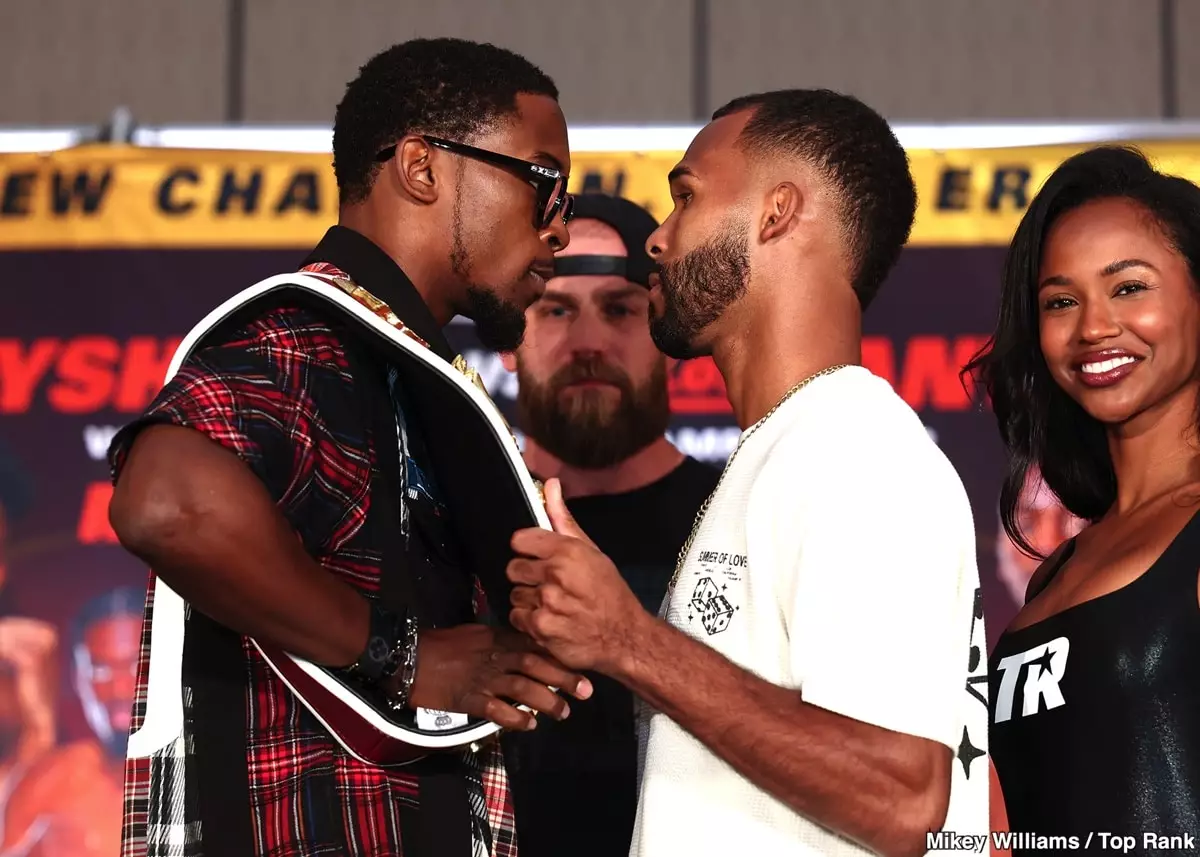In the world of professional boxing, trust and integrity between fighters, trainers, and fans are paramount. However, controversies often arise, especially when one party’s actions cast doubt on their commitment to the sport. The recent incident involving Keyshawn Davis, who intentionally weighed in significantly above the lightweight limit for his scheduled fight against Edwin De Los Santos, begs the question: was it a strategic move or a cowardly retreat? Trainer Greg Hackett certainly believes it’s the latter, stating that Davis’ hefty 4.3-pound overage indicates a lack of seriousness in pursuing the fight.
Davis’s weight at the weigh-in appears to be more than a simple oversight; it reeks of premeditation. When a fighter walks up to the scales knowing that they’re set to miss weight by such a considerable margin, it sends a message about their intentions—or rather, their lack thereof. Hackett’s assertion that Davis was scared of De Los Santos’s power raises an uncomfortable reality about fear in the ring. Fighters are known for their bravado, yet when faced with adversity, not every warrior stands tall. In this case, Davis’s actions could be interpreted as an admission of vulnerability.
Fear Dictating Action
Hackett’s comments shed light on the emotional landscape surrounding the fight. Davis, who has faced defeat at the hands of Andy Cruz in the past, might have felt that a loss to De Los Santos could further tarnish his reputation. This psychological struggle could have influenced his decision-making, leading him to deliberately weigh himself out of the fight, thereby escaping a potential humiliation. An athlete’s propensity to succumb to fear can manifest in various ways, and it may be that Davis opted for self-preservation over the honor of facing a formidable opponent.
The idea that he may have miscalculated De Los Santos’s desperation for the fight is equally troubling. Hackett’s hypothesis implies a lack of respect for his opponent, suggesting that Davis might have banked on De Los Santos accepting unfavorable conditions simply to get a shot in the ring. Such a strategy reflects poorly on Davis and raises ethical issues surrounding sportsmanship. This mindset not only affects Davis’s credibility but also contributes to a broader conversation about the integrity of the sport.
Consequences of Hesitation
What does this non-fight mean for Keyshawn Davis’s future? His credibility has taken a hit, and his pathway to redemption could be complicated. As Hackett pointed out, rather than exhibiting humility and stepping up, Davis’s actions show a reluctance to confront his real challenges. This might set a precedent for future behavior; when faced with adversity, will he again choose to dodge instead of deal?
In today’s era, where social media amplifies every action, Davis could face the wrath of fans and analysts alike. The boxing community is quick to criticize, and pundits will watch closely how he navigates the aftermath of this debacle. With every misstep, he risks alienating a fan base that craves authenticity and valor from their champions.
Davis’s failure to live up to expectations runs deeper than just one fight. It puts him at a crucial crossroads in his career—he must confront the narrative of fear that now shadows him. How can he reclaim his narrative and earn back the respect that has now been jeopardized? This internal battle may be even more daunting than facing a skilled opponent in the ring.
Implications for the Sport
Beyond Davis himself, the incident raises critical questions about the culture of boxing. Are fighters increasingly willing to forego the chance to prove themselves against formidable opponents? The emphasis on protection of record and marketability can lead to a self-serving mentality, ultimately harming the sport’s authenticity. Fans want to see warriors clash, not strategists weasel out of fights.
Furthermore, when a fighter prioritizes avoiding risk over the spirit of competition, it diminishes the sport’s narrative of triumph through struggle. While it’s essential to protect one’s career, boxing thrives on the idea of challenges being met head-on. Davis’s actions may resonate beyond him, sparking discussions about accountability and the future conduct of those within the sport.
Keyshawn Davis’s heavy weighing-in not only reveals cracks in his own preparedness and attitude but also highlights a troubling trend in boxing. Fans and fighters alike must reckon with the implications of such actions, forcing a re-evaluation of what it means to be truly competitive in this demanding sport.

